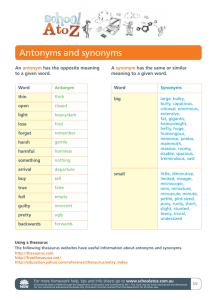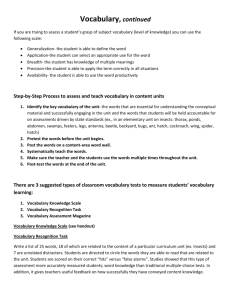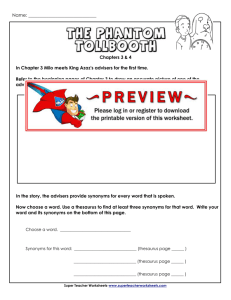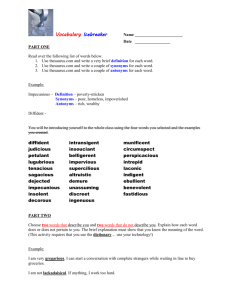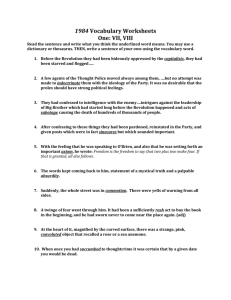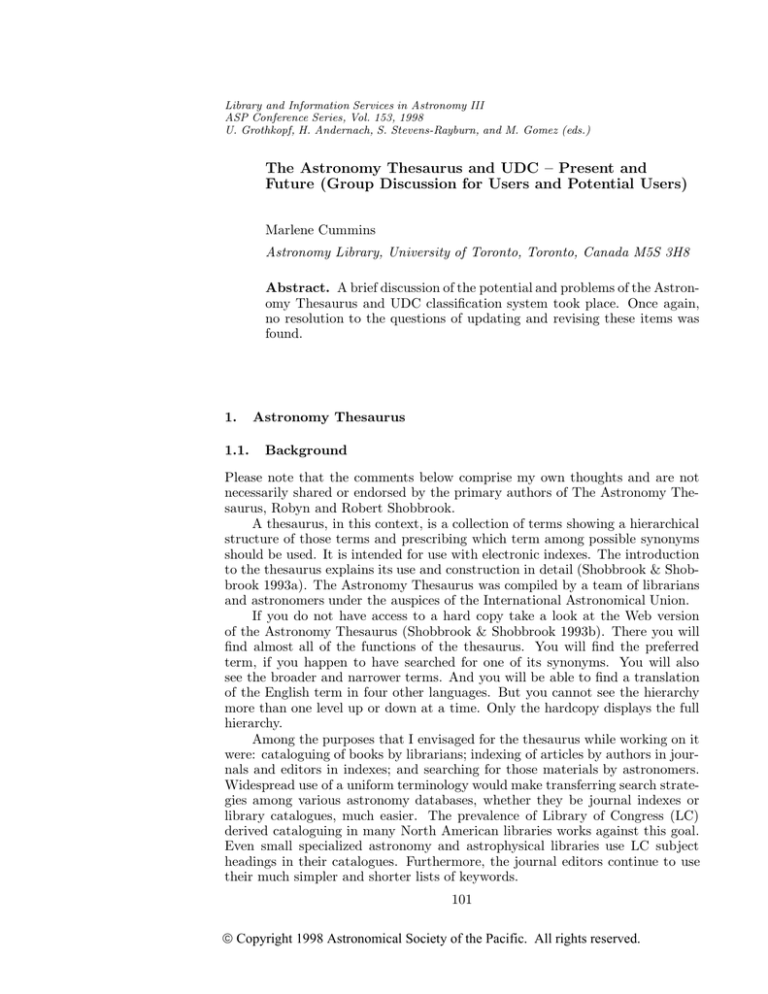
Library and Information Services in Astronomy III
ASP Conference Series, Vol. 153, 1998
U. Grothkopf, H. Andernach, S. Stevens-Rayburn, and M. Gomez (eds.)
The Astronomy Thesaurus and UDC – Present and
Future (Group Discussion for Users and Potential Users)
Marlene Cummins
Astronomy Library, University of Toronto, Toronto, Canada M5S 3H8
Abstract. A brief discussion of the potential and problems of the Astronomy Thesaurus and UDC classification system took place. Once again,
no resolution to the questions of updating and revising these items was
found.
1.
1.1.
Astronomy Thesaurus
Background
Please note that the comments below comprise my own thoughts and are not
necessarily shared or endorsed by the primary authors of The Astronomy Thesaurus, Robyn and Robert Shobbrook.
A thesaurus, in this context, is a collection of terms showing a hierarchical
structure of those terms and prescribing which term among possible synonyms
should be used. It is intended for use with electronic indexes. The introduction
to the thesaurus explains its use and construction in detail (Shobbrook & Shobbrook 1993a). The Astronomy Thesaurus was compiled by a team of librarians
and astronomers under the auspices of the International Astronomical Union.
If you do not have access to a hard copy take a look at the Web version
of the Astronomy Thesaurus (Shobbrook & Shobbrook 1993b). There you will
find almost all of the functions of the thesaurus. You will find the preferred
term, if you happen to have searched for one of its synonyms. You will also
see the broader and narrower terms. And you will be able to find a translation
of the English term in four other languages. But you cannot see the hierarchy
more than one level up or down at a time. Only the hardcopy displays the full
hierarchy.
Among the purposes that I envisaged for the thesaurus while working on it
were: cataloguing of books by librarians; indexing of articles by authors in journals and editors in indexes; and searching for those materials by astronomers.
Widespread use of a uniform terminology would make transferring search strategies among various astronomy databases, whether they be journal indexes or
library catalogues, much easier. The prevalence of Library of Congress (LC)
derived cataloguing in many North American libraries works against this goal.
Even small specialized astronomy and astrophysical libraries use LC subject
headings in their catalogues. Furthermore, the journal editors continue to use
their much simpler and shorter lists of keywords.
101
Copyright 1998 Astronomical Society of the Pacific. All rights reserved.
102
M. Cummins
Before spearheading a campaign to update the thesaurus, I wanted to know
how widely it is used and will be used. Specifically, I wanted to know how many
people use the thesaurus as a thesaurus proper, not just a translation dictionary.
1.2.
Summary of Discussion
A sprinkling of people indicated that they did use the thesaurus. Discussion
ensued about the use or rather non-use of the thesaurus by the editors of the
core astronomy journals. Of course, authors won’t use it unless directed to by
the editors. Nor is there any point to an indexing service such as the ADS
(Astrophysics Data Service) trying to include it – their indexing is provided by
the journals.
I related how, although I have approached some journal editors, so far they
have not shown any interest in using it. It was suggested that editors require
a different level of specificity of terms for journal articles than do librarians
cataloguing books. One can argue, however, that these different needs are accomodated in the thesaurus by the presence of a full hierarchy of terms – broad
ones and very specific ones.
Perhaps it is inertia or an incomplete understanding of the usefulness of the
thesaurus that has prevented its widespread adoption.
1.3.
Conclusion
It appears that unless a critical mass of journal editors take up the thesaurus as
an important tool, it will languish. Further exploration of its use by the journals
will be pursued before any major updating project is undertaken.
2.
2.1.
UDC classification scheme – Astronomy
Background
The UDC (Universal Decimal Classification) is, in some ways, a similar tool
to the Astronomy Thesaurus and has similar problems in terms of need for
revision and limited use. Many libraries use the LC classification system. For
some background on UDC see Wilkins (1998) and Dorokhova (1998).
The questions to be discussed were whether there are enough users of UDC
to justify revising it, who will do the revision and how.
2.2.
Summary of Discussion
A sprinkling of hands was raised in answer to the question of who uses UDC
and those people were invited to form a separate discussion group. This small
group raised problems such as the apparent unwillingness of the UDC consortium
to add new classes and the difficulty connected with national variations (e.g.
the version prescribed for use in Finland). A wish for more details about the
discussions that have taken place with the consortium was expressed.
2.3.
Conclusion
The group suggested that a short questionaire be distributed on the ASTROLIB
mailing list to determine how widespread use of UDC is.
The Astronomy Thesaurus and UDC
103
References
Dorokhova, T. N. 1998, Comments on UDC 52 Revision, these proceedings, 269
Shobbrook, R. M. & Shobbrook, R. R. 1993a, Astronomy Thesaurus, Epping,
New South Wales, Australia: Anglo-Australian Observatory for the International Astronomical Union
Shobbrook, R. M. & Shobbrook, R. R. 1993b, Astronomy Thesaurus, Epping,
New South Wales, Australia: Anglo-Australian Observatory for the International Astronomical Union, [Online], searchable database. Available:
http://msowww.anu.edu.au/library/thesaurus/ [1998, 12 May]
Wilkins, G. A. 1998, The Revision of UDC 52 and of the Astronomy Thesaurus,
these proceedings, 317


